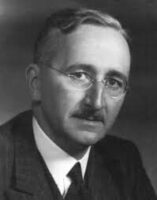What is Technological Unemployment? A good start is an article under discussion was published in 1930, by John Maynard Keynes, called ‘Economic Possibilities for our Grandchildren’ (1930)
The first question is – Why would an article published in 1930 by an English economist be relevant now?
Well to answer that, let’s have a very short look at Keynes himself.
Keynes was a respected economist who during his career worked for the government, as well as Cambridge University. During his time working for the government, he was economic advisor to the then prime minister David Lloyd George at the Versailles peace treaty conference between the Allies and Germany, after the 1st World War.
During his time at Cambridge University Keynes publishing articles that included – ‘The General Theory of Employment, Interest and Money’ (1936), ‘A Treatise on Money’ (1930) and ‘Tract on Monetary Reform’ (1923) which discussed monetary policy.
The theories Keynes developed, discussed and published revolutionised economics and became known as Keynesian economics.
These theories stated that Governments needed to use interest rates to maintain price stability, but also when depressions in the markets became apparent – governments needed to continue investing in the country, and this would also maintain a low unemployment rate.
So now we have a little understanding of who John Keynes was, his impact on economic theory, world and country economies and how his theories assisted governments to recover from downturns in the markets or recessions.
But how does this information answer the question ‘What is Technological Unemployment?’
Keynes, within his articles, puts forward a definition of what Technological Unemployment is: “Unemployment due to the discovery of means of economising the use of labour outrunning the pace at which we can find new uses for labour”
To put it another way, the use of machines (the term machines is used here, not to draw any specific difference between robots and/or computers) could reduce the need for people to perform some tasks, before we have found new tasks for those men/women to do.
Giving a real-life example: AmazonTM are investigating the use of drones to deliver packages. So for every parcel delivered by a drone, that is one less parcel the delivery person has to deliver. So, if there are enough drones then the delivery person is out of a job. (Lee, 2019).
But this is only a small part of this seminal article…Keynes goes on to discuss the effects on the labourer who has been replaced and the wider effects on society as a whole.
The needs of human beings are complex at the best of times, however, for our purposes, they can be separated into 2 classes. The 1st being an absolute need regardless of the situation. The 2nd need being a relative need, in the sense that we feel them if they are met, that the satisfaction we experience as a result ‘lifts us up’ or makes us feel superior to our fellows.
The absolute needs are those that enable us to survive, and the relative needs are the one that makes us want to collect more wealth so we feel superior to our fellows.
How does this description of needs assist us, in this definition of Technological Unemployment? Well, it goes a little way to explain a key point Keynes makes in the article.
This key point is that from the outset of time, man has needed to feel that he is providing for himself and his family by working. Keynes suggests that if we cannot work, we will not be fulfilling an absolute need.
So, in order to counter this Keynes suggests working a specified number of hours a week or a day, in order to fulfil the absolute need for work
But this still leaves a large amount of time to fill, how should we use this time? Could we use this time to increase our knowledge or become more creative?
Could the amount of free time become an issue in itself?
Keynes suggests that if we as individuals have too much free time, we would look forward to working. To put it simplistically most people, work in order to pay the bills and survive, but do not look forward to going into the work, but do so anyway.
Could we have the same feelings about leisure time, if we have an abundance of it?
Keynes also suggests, that the wealthy (to date) have been the vanguard of a society that has more free time, and he suggests they may not have made the best of the possibilities available to them. However, this seems to be changing as people such as Bill Gates, Zuckerberg, Jeff Bezos and Richard Branson, are using some of their resources to create new knowledge, support developing countries and create opportunities for people and businesses.
In Conclusion
The article was written nearly 90 years ago, it has become a little dated and makes some assumptions that do not take into account human nature and recurrent historical themes (e.g. wars and recessions).
Keynes remarks in his conclusions that if there are no wars or large increases in the population, then the changes caused by Technological Unemployment would not be great, and as technology replaced people’s job, they would be able to find new jobs.
90 years on, could these caveats seem a little naïve?
When Keynes wrote the article ‘Technological Unemployment’, was he thinking that a machine would replace a Mans / Woman’s job completely, as was implied, or would only specific tasks be replaced?
Was Keynes right in his interpretation of ‘Technical Unemployment’?
“Unemployment due to the discovery of means of economising the use of labour outrunning the pace at which we can find new uses for labour”
I believe that the definition can still be as applicable today as it was 90 years ago. But where Keynes was thinking about the loss of a complete job, reality has shown that it is the tasks within an individual’s job that will be replaced by machine/technology.
However, was Keynes right in his thinking that these tasks will be replaced by machines (technology) more quickly than new tasks for the individual worker can be found?
Please feel free to share your views and thoughts on Keynesian economics and how he applies his thinking to the question of technological unemployment………
Bibliography
Lee, D., 2019. Amazon to deliver by drone ‘within months’. [Online]
Available at: https://www.bbc.co.uk/news/technology-48536319
Keynes, M, John 1930. Economic Possibilities for our Grandchildren
Editors, Encyclopedia Brittanica, Oct 2019. John Maynard Keynes
Available at: https://www.britannica.com/biography/John-Maynard-Keynes
Editors, Library of Economists and Liberty, 2019. John Maynard Keynes
Available at: https://www.econlib.org/library/Enc/bios/Keynes.html
Next Blog
In my next blog I will look at the history of Technical Unemployment: how in the past machines have replaced the need for Human Labour, starting with the Luddites.




